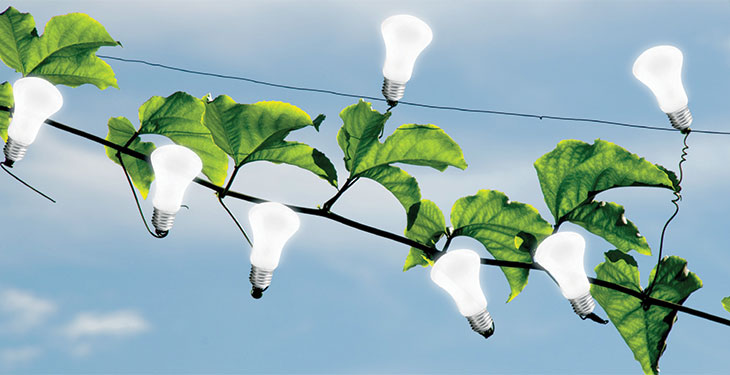At present, in Romania, we send to the landfill 97% of our waste and this costs us environmental problems, competitiveness, it undermines the recycling business and many other sectors that have to do with waste. Also, by throwing our waste, we have to use other resources for heating. We have the waste that undermines our economy and creates many problems, and at the same time, waste saves money and it is the solution for many other problems that Romania faces. To make use of waste, we need bioenergy. There are numerous reasons why Romania needs bioenergy, and it looks like it fits perfectly, like bionenergy is the missing piece of the puzzle so as to allow the economy to grow faster into the right direction.
 According to a JEREMIE study, 53 to 60% of our waste is biodegradable, which means it is not recyclable. So even if we recycle it perfectly, there is still this percentage that reaches the landfill if we do not do anything with it. The European Directive says that we can send to the landfill maximum 50% of our waste, by 2020. So even if we do all the recycling, with collection at source etc., we will still be over this threshold. Today we are sending to landfill 97% of the waste!
According to a JEREMIE study, 53 to 60% of our waste is biodegradable, which means it is not recyclable. So even if we recycle it perfectly, there is still this percentage that reaches the landfill if we do not do anything with it. The European Directive says that we can send to the landfill maximum 50% of our waste, by 2020. So even if we do all the recycling, with collection at source etc., we will still be over this threshold. Today we are sending to landfill 97% of the waste!
RECYCLING CANNOT PAY FOR BIOMASS
This causes major problems, first of all to the environment, because there is no control and there is no solution. Even when people want to solve the problem in a responsible way, there is no legislation to do it. Secondly, there is a law in Romania that says that you as a producer of food, if you do not find a solution that your waste will be processed and recycled, you have to pay a huge penalty for your non-recycled waste, which is 2.000 lei per ton. In many cases, this creates huge problems in competitivity and products become cheaper to be imported than to be produced here. Some might say, yes, but if we recycle, we solve the problem. Let’s see how it goes! Out of a ton of waste, you can sort around 450 kg and take them to recycling, but you also have to pay for the rest, which is biodegradable. Automatically, sorting and recycling cannot can support the cost of waste treatment, as proposed by the European Waste Treatment Hierarchy, a mandatory procedure since as early as 2014. As a result, if done properly, recycling becomes a business that loses money. If it loses money, then the operator will try to find ways not to lose money, and in order to do so one starts testing the limits of the law or one passes over these limits. In the happiest situation, one will stop treating the biodegradable part, and this will go to the landfill or nobody knows where. In other cases the situation is even worse.
WASTE MEANS AFFORDABLE HEATING
We have waste distributed in many different areas of the country, a country that does not have the necessary modern infrastructure for the national electricity grid, the pipes and the grid for heating. Where we do not have the infrastructure and we need billions in order to bring the energy where we need it with modern solutions, we have waste. We can resolve the problem ad hoc, on the spot, without needing to invest money in infrastructure. In many situations we have measured that with modern technologies, with combined heat and power, or maybe with heat only, depending on the situation. Using our sorted waste, their biodegradable fraction as the raw material, we can create synergies that reduce the invoice for the citizens, and they can pay less for heat. We can use the heat for greenhouses and for other new or existing businesses.
For so many problems – environment, pollution, competitiveness, access and affordability etc., bioenergy – biomass and biogas – represent the solution. This country will never move forward from energy point of view without including biomass and biogas in the energy mix. Besides, with bioenergy in place, energy independence is also improved.
WE HAVE GRANTS SUPPORTING OUR SECTOR
We have the first signs that politicians have understood all these. First of all, we have European grants that are focused on supporting bioenergy, and there are very few countries in the EU that support bioenergy projects from European grants. The session to submit projects has opened recently, so if there are projects, there is money to support them.
We also have financed projects for the cogeneration of high efficiency, where we also have projects for bioenergy. These are direct subventions for the investment, and for the first time we have significant grants for supporting our sector, and only for our sector.
Is it enough? No, but it is a good start. Mainly we need the bioenergy law, because in many cases, one also needs a feed-in tariff or an income that supports the project throughout the operation, for an entire investment cycle of 15 years. In other European countries, it may be 20 to 25 years, here it is 15 years, as it was established for the green certificate scheme, and we do not want to change that.
And there are two main categories of projects. The first one has to deal with projects of up to 1 MW, like agricultural projects, and projects related with the food industry, because we do not want to use one cubic mm of illegal logging.
Our proposal for the projects of up to 1 MW that belong to these categories is to support them with a feed-in premium, as the European Directive also proposes. What does it mean? Let’s say you have a feed-in price of 150 euro. You go to the market, and you sell the energy for 40 euro or 50 euro. The state supports you with the difference of 110 euro or 100 euro, and not with the whole price. We propose this version because we expect that the energy prices will increase for the years to come in Romania, and it is a better approach to let the market pay, with the state only to pay for the difference.
This way, year by year, people will pay less money for this support. We believe subventions have to support a minimum, and not a maximum income. We are against supporting a maximum income, as we know what happened for green certificates. We do not want anyone to get 30 to 40% IRR (internal rate of return), even if people get upset with us!
For now, in Romania, waste it is not treated as a problem as it is the case in the rest of Europe. It is going to be a delay until at least 2019 in order to finally implement a form of penalty for each ton of waste that reaches the landfill. In 2019-2020, we will have a scheme that will cost 18 or 27 euros for each ton that reaches the landfill, plus other costs. If we do not implement such penalties, we are expected to pay a serious amount of money – hundreds of thousands of euros per day for not implementing the UE Directive.
TENDERS, INSTEAD OF PENALTIES
Waste should be approached not only as an issue to be solved with subventions. First, because we do not have the money, and secondly because we want to go as close to the market as possible. Let’s take a business which generates 10.000 tons of waste per year. It depends on the business, but let’s say that 6.000 tons will be biodegradable waste. From 2019, you will have to pay 18 euros for the first year, then 27 euro per ton per year. This means that you will about 160.000 euros. Instead of paying this amount, lose the money and the waste still to reach the landfill, we propose you ought to be allowed to organize a tender.
You will be interested to find someone to take the waste and even to pay for this service any sum less than 27 euros per ton. In our proposal, the waste generator pays directly the company that resolves his problem with a price which is less than the penalty. The state does not have to support this operation at all. The company that takes the waste has to treat it according to all the EU directives, to use it for biomass and biogas projects, depending on the technology that we want to use. At the end of the day, abiding to all the certificates and the necessary authorizations we will prove that we process this waste and transform it into something else: energy, heat and so on.
Such a scheme is market oriented and it allows people to go in tenders and sign contracts for many years. Automatically, these projects will be feasible without money from the state, with no fiscal pressure. It is also very important, that the producers receiving this income will be forced by the market to sell the power or heat, at competitive price, and to find efficiently ways to use their byproducts.
We are ready to move forward and in the following period we are expecting for the bioenergy law to proceed in the voting, in the Parliament. This system embraces our proposals and it makes people think and act efficiently; the waste will not go to the landfill anymore, but will become a source that will generate fuel, money, value, jobs, heat. Most important of all, we will transform Romania from the country that sends 97% of is waste to the landfill, to a country that will send less than 20%, in 5 to 6 years’ time, because with such a system, automatically recycling becomes feasible from economic point of view.
—————————————-
This article is based on the speech Mr. Ilias Papageorgiadis presented during the Valmet Day in Bucharest, in October, and it firstly appeared in the printed edition of energynomics.ro Magazine, issued in December 2017.
In order to receive this issue of energynomics.ro Magazine, we encourage you to write us at office [at] energynomics.ro to include you in our distribution list. All previous editions are available HERE.
